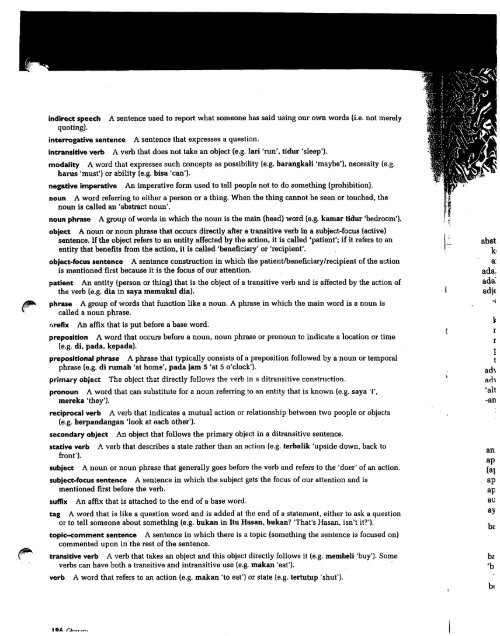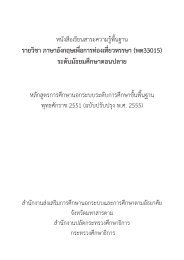bahasa indonesia
djenar-2003-a-students-guide-to-indonesian-grammar-oxford
djenar-2003-a-students-guide-to-indonesian-grammar-oxford
- No tags were found...
You also want an ePaper? Increase the reach of your titles
YUMPU automatically turns print PDFs into web optimized ePapers that Google loves.
indirect speech A sentence used to report what someone has said using our own words (i.e. not merely<br />
quoting).<br />
interrogative sentence A sentence that expresses a question.<br />
intransitive verb<br />
A verb that does not take an object (e.g. lari 'run', tidur 'sleep'),<br />
modality A word that expresses such concepts as possibility (e.g. barangkali 'maybe'), necessity (e.g.<br />
harus 'must') or ability [e.g. bisa 'can').<br />
negative imperative An imperative form used to tell people not to do something (prohibition).<br />
noun A word referring to either a person or a thing. When the thing cannot be seen or touched, the<br />
noun is called an 'abstract noun'.<br />
noun phrase A group of words in which the noun is the main (head) word [e.g. kamar tidur 'bedroom').<br />
object A noun or noun phrase that occurs directly after a transitive verb in a subject-focus (active)<br />
sentence. If the object refers to an entity affected by the action, it is called 'patient'; if it refers to an<br />
entity that benefits from the action, it is called 'beneficiary' or 'recipient'.<br />
object-focus sentence A sentence constru~tio~ in which the patient/beneficiary/recipient of the action<br />
is mentioned first because it is the focus of our attention.<br />
patient An entity (person or thing) that is the object of a transitive verb and is affected by the action of<br />
the verb (e.g. dia in saya rnemukul dia).<br />
phrase A group of words that function like a noun. A phrase in which the main word is a noun is<br />
called a noun phrase.<br />
firefix<br />
An affix that is put before a base word,<br />
preposition A word that occurs before a noun, noun phrase or pronoun to indicate a location or time<br />
[e.g. di, pada, kepada).<br />
prepositional phrase A phrase that typically consists of a preposition followed by a noun or temporal<br />
phrase (e.g. di nunah 'at home', pada jam 5 'at 5 o'clock').<br />
primary object The object that directly follows the verb in a ditransitive construction.<br />
pronoun A word that can substitute for a noun referring to an entity that is known (e.g, saya '1''<br />
mereka 'they').<br />
reciprocal verb A verb that indicates a mutual action or relationship between two people or objects<br />
(e.g. berpandangan 'look at each other').<br />
secondary object An object that follows the primary object in a ditransitive sentence.<br />
stative verb<br />
A verb that describes a state rather than an action (e.g. terbalik 'upside down, back to<br />
abst<br />
kt<br />
a:<br />
ada,<br />
ada<br />
adj~<br />
-i<br />
. -<br />
front I).<br />
subject<br />
A noun or noun phrase that generally goes before the verb and refers to the 'doer' of an action.<br />
subject-focus sentence A sentence in which the subject gets the focus of our attention and is<br />
mentioned first before the verb.<br />
suffix<br />
tag<br />
An affix that is attached to the end of a base word.<br />
A word that is like a question word and is added at the end of a statement, either to ask a question<br />
or to tell someone about something (e.g. bukan in Itu Hasan, bukan? 'That's Hasan, isn't it?').<br />
topic-comment sentence A sentence in which there is a topic (something the sentence is focused on)<br />
commented upon in'the rest of the sentence.<br />
transitive verb A verb that takes an object and this object directly follows it (e.g. membeli 'buy'). Some<br />
verbs can have both a transitive and intransitive use (e-g. makan 'eat').<br />
verb A word that refers to action (e.g. makan 'to eat') or state (e.g. tertutpp 'shut').



